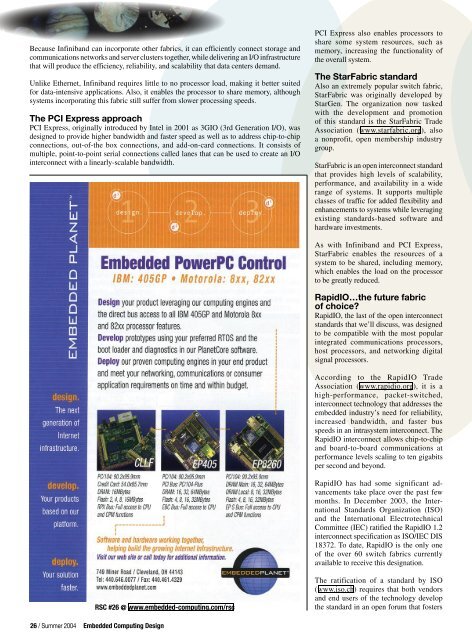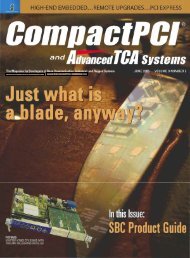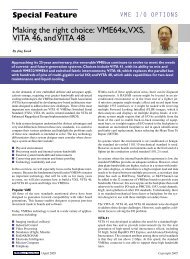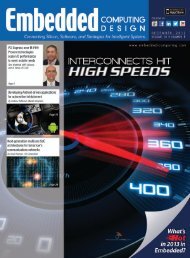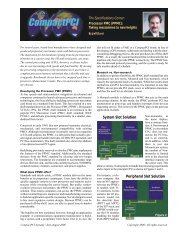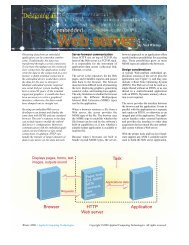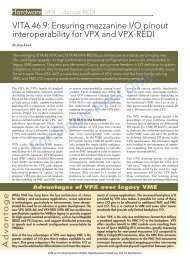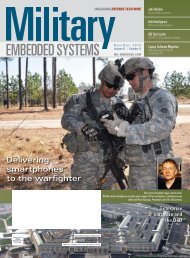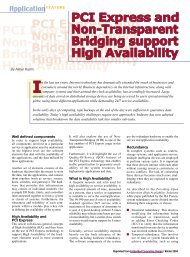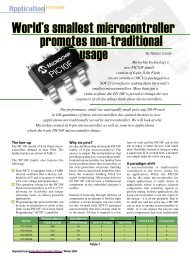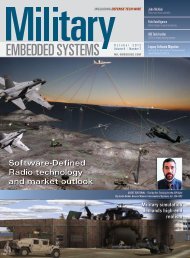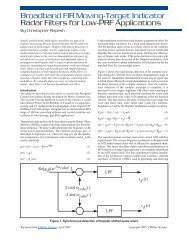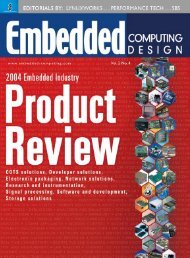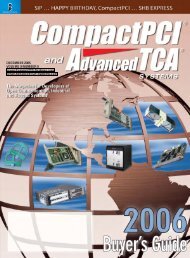Embedded Computing Design - OpenSystems Media
Embedded Computing Design - OpenSystems Media
Embedded Computing Design - OpenSystems Media
Create successful ePaper yourself
Turn your PDF publications into a flip-book with our unique Google optimized e-Paper software.
Because Infiniband can incorporate other fabrics, it can efficiently connect storage and<br />
communications networks and server clusters together, while delivering an I/O infrastructure<br />
that will produce the efficiency, reliability, and scalability that data centers demand.<br />
Unlike Ethernet, Infiniband requires little to no processor load, making it better suited<br />
for data-intensive applications. Also, it enables the processor to share memory, although<br />
systems incorporating this fabric still suffer from slower processing speeds.<br />
The PCI Express approach<br />
PCI Express, originally introduced by Intel in 2001 as 3GIO (3rd Generation I/O), was<br />
designed to provide higher bandwidth and faster speed as well as to address chip-to-chip<br />
connections, out-of-the box connections, and add-on-card connections. It consists of<br />
multiple, point-to-point serial connections called lanes that can be used to create an I/O<br />
interconnect with a linearly-scalable bandwidth.<br />
PCI Express also enables processors to<br />
share some system resources, such as<br />
memory, increasing the functionality of<br />
the overall system.<br />
The StarFabric standard<br />
Also an extremely popular switch fabric,<br />
StarFabric was originally developed by<br />
StarGen. The organization now tasked<br />
with the development and promotion<br />
of this standard is the StarFabric Trade<br />
Association (www.starfabric.org), also<br />
a nonprofit, open membership industry<br />
group.<br />
StarFabric is an open interconnect standard<br />
that provides high levels of scalability,<br />
performance, and availability in a wide<br />
range of systems. It supports multiple<br />
classes of traffic for added flexibility and<br />
enhancements to systems while leveraging<br />
existing standards-based software and<br />
hardware investments.<br />
As with Infiniband and PCI Express,<br />
StarFabric enables the resources of a<br />
system to be shared, including memory,<br />
which enables the load on the processor<br />
to be greatly reduced.<br />
RapidIO…the future fabric<br />
of choice<br />
RapidIO, the last of the open interconnect<br />
standards that we’ll discuss, was designed<br />
to be compatible with the most popular<br />
integrated communications processors,<br />
host processors, and networking digital<br />
signal processors.<br />
According to the RapidIO Trade<br />
Association (www.rapidio.org), it is a<br />
high-performance, packet-switched,<br />
interconnect technology that addresses the<br />
embedded industry’s need for reliability,<br />
increased bandwidth, and faster bus<br />
speeds in an intrasystem interconnect. The<br />
RapidIO interconnect allows chip-to-chip<br />
and board-to-board communications at<br />
performance levels scaling to ten gigabits<br />
per second and beyond.<br />
RapidIO has had some significant advancements<br />
take place over the past few<br />
months. In December 2003, the International<br />
Standards Organization (ISO)<br />
and the International Electrotechnical<br />
Committee (IEC) ratified the RapidIO 1.2<br />
interconnect specification as ISO/IEC DIS<br />
18372. To date, RapidIO is the only one<br />
of the over 60 switch fabrics currently<br />
available to receive this designation.<br />
RSC #26 @ www.embedded-computing.com/rsc<br />
The ratification of a standard by ISO<br />
(www.iso.ch) requires that both vendors<br />
and end users of the technology develop<br />
the standard in an open forum that fosters<br />
26 / Summer 2004 <strong>Embedded</strong> <strong>Computing</strong> <strong>Design</strong>


